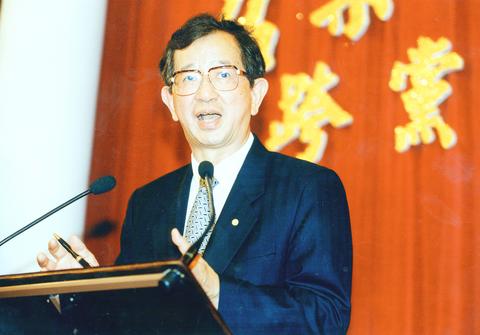Lee Yuan-tseh (李遠哲), leader of Academia Sinica, will represent President Chen Shui-bian (陳水扁) at the APEC leaders' summit later this month. The Presidential Office is expected to make the announcement today.
President Chen yesterday told reporters that he had received an invitation delivered by an envoy dispatched by Mexican President Vincente Fox, the host of the APEC meeting this year.

TAIPEI TIMES FILE PHOTO
A close aide to the president confirmed the invitation was addressed directly to Lee, which indicated that the candidate had already gained permission from the host country.
The 10th APEC leaders' summit will be held on Oct. 26 and Oct. 27 in Los Cabos, Mexico. Lee will sit next to US President George W. Bush.
Along with China and Hong Kong, Taiwan was admitted to the 21-member economic grouping in 1991 under the name "Chinese Taipei."
According to a memorandum of understanding signed in 1991, only economic decision-makers can attend the leadership gathering.
Since the meeting of APEC leaders in 1993 in Seattle, Beijing has pressured the conference's organizers to refuse to let Taiwan's president, vice president, premier or vice premier represent the country at the group's annual summits.
The presidential aide said that in choosing Lee as the candidate, the president was considering his image, international reputation and his command of English.
Lee is a 1986 Nobel laureate in chemistry and the president of the country's highest research institution.
Chen intended to appoint Lee to represent him at the APEC unofficial leaders' summit two years ago, but the arrangement was called off because of opposition from China as a result of Lee's endorsement of Chen during the presidential campaign.
But China seems to have eased its hostility toward Lee after letting him make a visit to Beijing in June, when Lee attended an international academic conference in the city after being refused a visa to enter China for the past two years.
APEC was initially designed as an economic forum when it was launched in 1989, but political issues usually steal the limelight.
Last year Taiwan was forced to be absent from the leader's summit as China, the host country, refused to extend an invitation to former vice president Li Yuan-tzu (李元簇), who was Chen's choice for Taiwan's representative at the meeting.
Although China did not explain its behavior, it was widely believed that Beijing considered Li's former position as vice president unsuitable.
Taiwan's absence from the meeting provoked an outcry from the pro-China opposition camp and triggered concern from other APEC members.
Having learned from past experience, the administration has been particularly circumspect in choosing Chens envoy this year. Officials have said that Lee's status as an academic also helps avoid the complications that a political figure would create.
Nevertheless, Taiwan is apprehensive that China may utilize its diplomatic advantage to pressure the host country -- as happens in almost all APEC meets -- to demote Taiwan's status.

AIR SUPPORT: The Ministry of National Defense thanked the US for the delivery, adding that it was an indicator of the White House’s commitment to the Taiwan Relations Act Deputy Minister of National Defense Po Horng-huei (柏鴻輝) and Representative to the US Alexander Yui on Friday attended a delivery ceremony for the first of Taiwan’s long-awaited 66 F-16C/D Block 70 jets at a Lockheed Martin Corp factory in Greenville, South Carolina. “We are so proud to be the global home of the F-16 and to support Taiwan’s air defense capabilities,” US Representative William Timmons wrote on X, alongside a photograph of Taiwanese and US officials at the event. The F-16C/D Block 70 jets Taiwan ordered have the same capabilities as aircraft that had been upgraded to F-16Vs. The batch of Lockheed Martin

GRIDLOCK: The National Fire Agency’s Special Search and Rescue team is on standby to travel to the countries to help out with the rescue effort A powerful earthquake rocked Myanmar and neighboring Thailand yesterday, killing at least three people in Bangkok and burying dozens when a high-rise building under construction collapsed. Footage shared on social media from Myanmar’s second-largest city showed widespread destruction, raising fears that many were trapped under the rubble or killed. The magnitude 7.7 earthquake, with an epicenter near Mandalay in Myanmar, struck at midday and was followed by a strong magnitude 6.4 aftershock. The extent of death, injury and destruction — especially in Myanmar, which is embroiled in a civil war and where information is tightly controlled at the best of times —

Taiwan was ranked the fourth-safest country in the world with a score of 82.9, trailing only Andorra, the United Arab Emirates and Qatar in Numbeo’s Safety Index by Country report. Taiwan’s score improved by 0.1 points compared with last year’s mid-year report, which had Taiwan fourth with a score of 82.8. However, both scores were lower than in last year’s first review, when Taiwan scored 83.3, and are a long way from when Taiwan was named the second-safest country in the world in 2021, scoring 84.8. Taiwan ranked higher than Singapore in ninth with a score of 77.4 and Japan in 10th with

China's military today said it began joint army, navy and rocket force exercises around Taiwan to "serve as a stern warning and powerful deterrent against Taiwanese independence," calling President William Lai (賴清德) a "parasite." The exercises come after Lai called Beijing a "foreign hostile force" last month. More than 10 Chinese military ships approached close to Taiwan's 24 nautical mile (44.4km) contiguous zone this morning and Taiwan sent its own warships to respond, two senior Taiwanese officials said. Taiwan has not yet detected any live fire by the Chinese military so far, one of the officials said. The drills took place after US Secretary